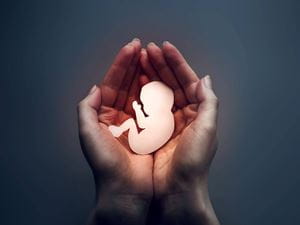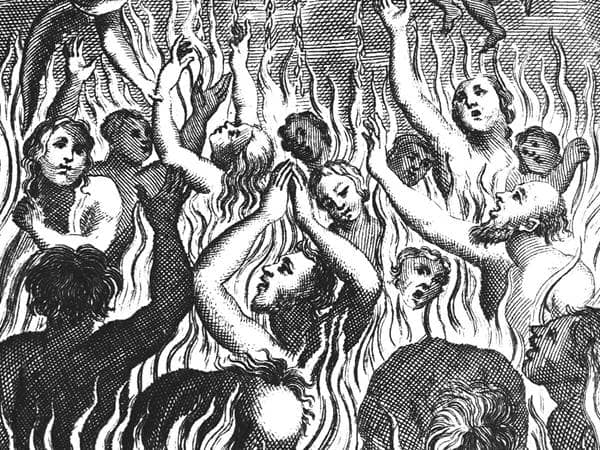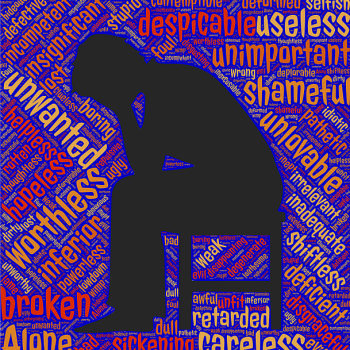
Because modern science has provided a number of ways to abort a fetus, from surgeries to pills, one may assume that abortion is actually something only discovered in modern times. However, it is known to have been practiced in antiquity, though in ways different from what we would do today. For example, Soranus of Ephesus(circa 1st-2nd centuries CE) encouraged aggressive physical exercise by a woman as a means of ending an unwanted pregnancy. In addition, he believed that bloodletting, extreme fasting, and even the partaking of certain herbs had the power to terminate an unwanted pregnancy.
Biblical Principles and Perspectives on Abortion
That being said, nowhere in the Bible are the Hebrew and Greek words for “abortion” present. Thus, there is no direct prohibition against it—though there are a number of passages in the biblical text that teach principles suggestive of the idea that abortion would have been forbidden by God in ancient times. What follows are a few of the most commonly cited passages to suggest that abortion is not generally a permissible practice for Christians.
Exodus 21:22-25: The Legal Ramifications
While not talking about an intentional abortion, perhaps the passage that deals with the closest thing to an abortion mentioned in the Bible would be Exodus chapter 21. We read: “If men fight with each other and injure a pregnant woman so that she gives birth prematurely and the baby lives, yet there is no further injury, the one who hurt her must be punished with a fine paid to the woman’s husband, as much as the judges decide. But if there is any further injury, then you shall require as a penalty life for life, eye for eye, tooth for tooth, hand for hand, foot for foot, burn for burn, wound for wound, bruise for bruise.” (AMP Exodus 21:22-25) According to this commandment, if someone accidentally causes a pregnant woman to miscarry, and that baby is injured in the process or even dies, then the person who caused the injury should be injured in the same way. If the baby lost an eye, then the person causing the injury to the premature fetus should also lose an eye. If the baby were killed through the miscarriage, then the person causing the pre-mature birth should be put to death as well. If this is true of an accidental miscarriage, would it not be even more true of an intentional abortion? If God says the accidental killing of a fetus is worthy of death, would He not even more strongly argue that same penalty for someone who intentionally killed a fetus or baby?
The Moral Imperative: Exodus 20:13 and Leviticus 24:17
One of the most commonly cited commandments to argue against abortion is God’s command in the Decalogue (or Ten Commandments), where He states, “Thou shalt not kill” (KJV Exodus 20:13) or, as the Hebrew says, “You shall not murder.” Similarly, in the 24th chapter of Leviticus, we are told: “Whoever takes a human life shall surely be put to death.” (ESV Leviticus 24:17) Of course, whether or not these two verses apply to abortion comes down to when you believe a fetus is “alive.” If at conception, when cells start to divide and life is being formed in the womb, then any abortion is “murder” and covered by these two commandments. If, on the other hand, you believe life does not exist until birth, then an abortion up until the actual time of delivery would not be considered “killing.” Not all Christians are going to agree as to when life first begins. However, a statistically high percentage take the position that life is present well before delivery. As evidence of this view, one of the most famous narratives in the New Testament informs us: “And when Elizabeth heard the greeting of Mary, the baby leaped in [Elizabeth’s] womb. And Elizabeth… exclaimed…‘when the sound of your greeting came to my ears, the baby in my womb leaped for joy.’” (ESV Luke 1:41-42 & 44) Clearly, John (who was the fetus in Elizabeth’s womb) acknowledged both Mary’s voice and the fetus in her womb. Could he have done so were he not a living, thinking being—though yet just a fetus? Regardless, for most Christians (and many people of other faith traditions), Exodus 20:13 and Leviticus 24:17 would place prohibitions on abortion because they command us to not terminate the life of a living being. Much like God’s declaration in Leviticus 24:17, in the Book of Genesis, we are told: “I created humans to be like me, and I will punish any…person that takes a human life. If…a person takes the life of another, that person must be put to death.” (CEV Genesis 9:5-6) Setting aside the penalty of death for “the person that takes…life,” the majority of Bible believers would argue that an abortion—at any stage—is killing something living. Again, not all will agree that what exists in the womb (prior to birth) is a “human.” However, scientifically speaking, one can hardly argue that it is not alive, regardless of whether you refer to it as a “human,” a “fetus,” a “baby,” or a “collection of cells” that move, breathe, take nourishment, etc. Thus, for some, Genesis 9 forbids the taking of life—and abortion always kills something living.
Some also understand the 139th Psalm as a prohibition against abortion. That text states of God: “You are the one who put me together inside my mother's body.” (CEV Psalm 139:13) Similarly, Ecclesiastes chapter 11 states: “As you do not know the way the spirit comes to the bones in the womb of a woman with child, so you do not know the work of God who makes everything.” (ESV Ecclesiastes 11:5) The reason the psalm is seen as a prohibition against abortion is because it acknowledges God as the creator of the fetus, as the one who gave life to the baby. The reason the passage from Ecclesiastes is seen as prohibiting abortion is because it suggests that those humans who kill fetuses do not really understand that God has placed in the womb not just a mass of growing cells, but within those cells the “spirit” of a “living being.” The fact that God chose to “put together” inside of a “mother’s body” a fetus to which He attached a spirit suggests that He willed its birth and life. Thus, to abort the fetus is to seek to thwart the will of God in organizing matter in order to form a human being.
Ethical Reflections: Isaiah's Warning and the Value of Life
In an era when abortion is often spoken of as “reproductive health” or “women’s healthcare,” those who abhor abortion point out the words of Isaiah: “Woe to those who call evil good and good evil, who put darkness for light and light for darkness, who put bitter for sweet and sweet for bitter!” (ESV Isaiah 5:20) We are not being political when we acknowledge that “reproductive health” for women sometimes requires (or results in) the end of the “health” of the fetus. Thus, abortion opponents see in Isaiah’s words the foreshadowing of a day when the right to take the life of a fetus would be considered good and something to be protected. Obviously even Christian women acknowledge that there are times when this form of “healthcare” or this type of procedure must be engaged in. However, those who look to the Bible for commandments that seem to forbid abortion often see this passage as supporting their view.
In the Psalms, we are told, “Behold, children are a heritage from the Lord, the fruit of the womb a reward.” (ESV Psalm 127:3) For opponents of abortion, this verse points out the thing that they feel proponents of abortion don’t get; namely that “children are a blessing” and “the fruit of the womb” is a “reward” or gift from God. Again, most who have an abortion do not see children as something to be thrown away, murdered, or not cared for. Surely most women who have an abortion do so because of their circumstances in life. Nonetheless, those who oppose abortion see this psalm as teaching why abortion should be limited.
While over passages could be cited to support a prohibition on “abortions of convenience,” suffice it to say that the Bible never specifically mentions abortion and, thus, never directly condemns it. However, the aforementioned passages are typically seen as evidence that God sees all human life as sacred and, thus, the taking of the life of even a partially formed human would stand in opposition to several commandments given by God in the Bible. Consequently, most Christians don’t see the lack of a direct command against an abortion as evidence that God is supportive of the procedure. On the contrary, most feel that there are so many verses in the Bible about the necessary preservation of life that one needn’t have a direct command to make most abortions inappropriate in the eyes of God and in the lives of believers.
Bible Verses about Abortion
Exodus 21:22-25 (AMP): "If men fight with each other and injure a pregnant woman so that she gives birth prematurely and the baby lives, yet there is no further injury, the one who hurt her must be fined as the woman’s husband demands of him, and he shall pay as the judges decide. But if there is injury, then you shall appoint as a penalty life for life, eye for eye, tooth for tooth, hand for hand, foot for foot, burn for burn, wound for wound, bruise for bruise."
Exodus 20:13 (KJV): "Thou shalt not kill."
Leviticus 24:17 (ESV): "Whoever takes a human life shall surely be put to death."
Luke 1:41-42, 44 (ESV): "And when Elizabeth heard the greeting of Mary, the baby leaped in her womb. And Elizabeth was filled with the Holy Spirit, and she exclaimed with a loud cry, ‘Blessed are you among women, and blessed is the fruit of your womb! And why is this granted to me that the mother of my Lord should come to me? ... For behold, when the sound of your greeting came to my ears, the baby in my womb leaped for joy."
Genesis 9:5-6 (CEV): "I created humans to be like me, and I will punish any wild animal or person that takes a human life. Human life is sacred; if a person takes the life of another, that person must be put to death."
Psalm 139:13 (CEV): "You are the one who put me together inside my mother's body."
Ecclesiastes 11:5 (ESV): "As you do not know the way the spirit comes to the bones in the womb of a woman with child, so you do not know the work of God who makes everything."
Isaiah 5:20 (ESV): "Woe to those who call evil good and good evil, who put darkness for light and light for darkness, who put bitter for sweet and sweet for bitter!"
Psalm 127:3 (ESV): "Behold, children are a heritage from the Lord, the fruit of the womb a reward."
3/22/2024 8:50:11 PM

















